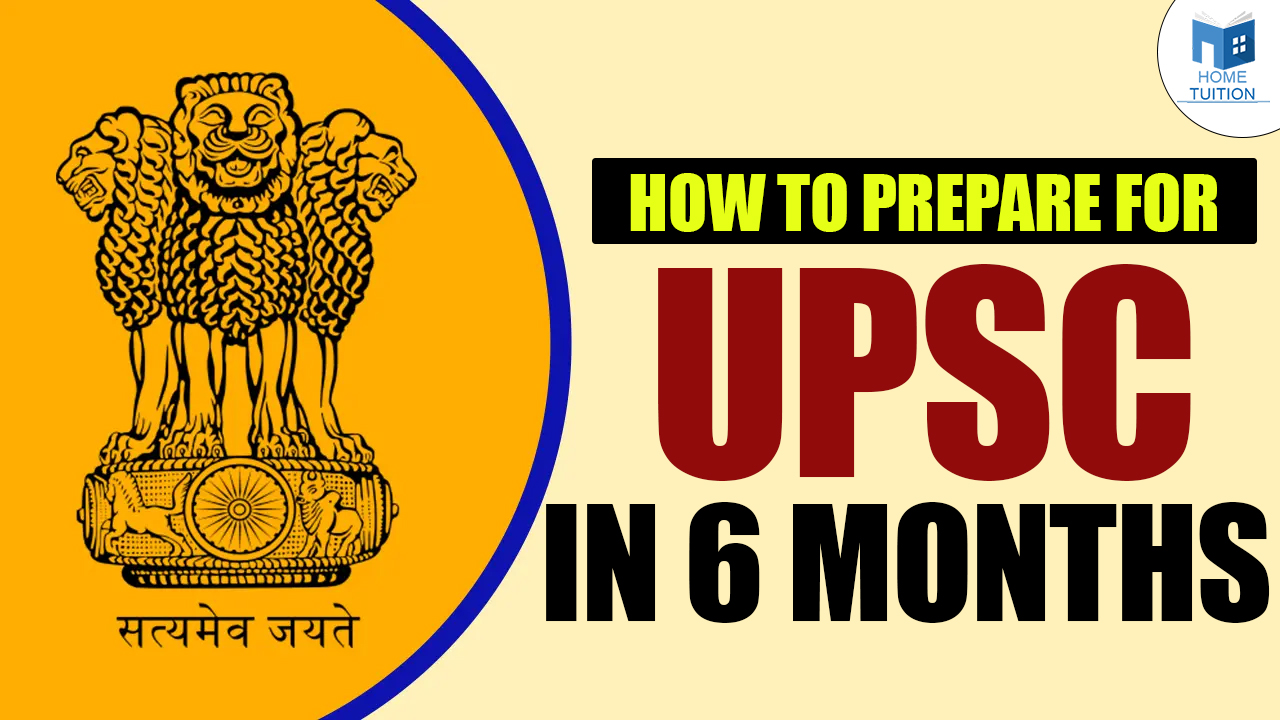How to Prepare for UPSC in 6 Months
The UPSC Civil Services Exam (CSE) is one of the most challenging exams in India, and many aspirants aim to crack it within a limited timeframe. If you're wondering how to prepare for UPSC CSE in 6 months, you need a well-structured plan that balances time, effort, and effective study techniques. In this blog, we will explore practical strategies to help you prepare for the UPSC Prelims in just six months.

Is It Possible to Prepare for UPSC in 6 Months?
Before diving into the preparation strategy, many aspirants often search: Is 6 months enough to prepare for UPSC Prelims? The answer is yes, but it depends on how efficiently you use your time. You need to focus on the most important topics, revise frequently, and take multiple mock tests to gauge your progress. Let's explore how to prepare for UPSC Prelims in 6 months step by step.
6-Month Preparation Strategy for UPSC Prelims
To ensure success in the UPSC Prelims within six months, follow these steps:
1. Understand the Syllabus and Exam Pattern
The first step is to thoroughly understand the UPSC syllabus and UPSC exam pattern. Focus on key areas like:
- General Studies Paper 1: History, Geography, Polity, Economy, Environment, and Science & Technology.
- General Studies Paper 2 (CSAT): Comprehension, Logical Reasoning, and Quantitative Aptitude.
By understanding the syllabus, you'll know exactly how to prepare for UPSC CSE in 6 months and where to direct your efforts.
2. Create a Timetable
A well-structured timetable is crucial for those wondering how to prepare for UPSC Pre in 6 months. Allocate specific time slots for each subject and stick to the schedule. Here’s a sample timetable:
- Morning: Current Affairs and Newspaper Reading
- Afternoon: Static Subjects like History, Geography, and Polity
- Evening: CSAT Preparation and Practice Papers
- Night: Revision of Important Topics
Make sure to revise weekly and adjust your timetable according to your progress.
3. Prioritize Important Topics
When time is limited, it’s essential to focus on the high-scoring areas. For example:
- History: Focus on Modern Indian History, Freedom Struggle, and Post-Independence India.
- Polity: Concentrate on the Constitution, Parliament, Fundamental Rights, and Duties.
- Geography: Indian and World Geography, along with Physical Geography, should be prioritized.
- Current Affairs: Dedicate time daily to reading current events, editorials, and analysis of important issues.
4. Use Quality Study Material
Choosing the right study material is key when preparing in such a short time. Here’s a list of essential resources:
- NCERT Books (Class 6-12) for basic concepts
- Laxmikanth for Polity
- Spectrum for Modern History
- Ramesh Singh for Economy
- Shankar IAS for Environment
5. Mock Tests and Previous Year Papers
Mock tests and solving previous year question papers are integral parts of how to prepare for UPSC Pre in 6 months. Start solving mock tests after 2-3 months of preparation. It will not only help you identify weak areas but also improve your time management skills.
Incorporate mock tests for both GS Paper 1 and CSAT in your daily or weekly routine. Solving at least 20-30 full-length mock tests is highly recommended.
6. Current Affairs and Daily News
Current Affairs plays a major role in UPSC Prelims. Follow reliable sources like:
- The Hindu
- Indian Express
- PIB
- RSTV
Subject-Wise Strategy
For better clarity, here's a brief subject-wise strategy for how to prepare for UPSC Prelims in 6 months:
- Polity: Study Indian Polity by Laxmikanth, revise key provisions of the Constitution, and focus on recent amendments.
- History: Cover Modern History in-depth, and give special attention to Ancient and Medieval India as well.
- Geography: Focus on Indian Geography, especially rivers, mountains, and natural resources. World Geography should also be covered.
- Economy: Focus on the basics of the Indian Economy, Budget, Economic Survey, and important government schemes.
- Environment: Study from Shankar IAS and stay updated with recent environmental conventions and protocols.
Revision Tips
Revision is key to cracking the UPSC exam. Keep these revision tips in mind:
- Revise each subject at least 3-4 times before the exam.
- Make short notes and refer to them frequently.
- Avoid adding new sources close to the exam date.
Recent Blogs
- btech it vs cse
- class 10 science important topics
- quick revision checklist for cbse class 10 science board exam 2026
- career options after 12th for science students
- how to score 95 in cbse class 10 english smart preparation guide
- how to become space scientist in india
- difference between be and btech
- how to attempt cbse class 10 science paper 2026
- how to attempt cbse class 10 english paper 2026
- hummingbird facts for kids discover the tiny birds with superpowe